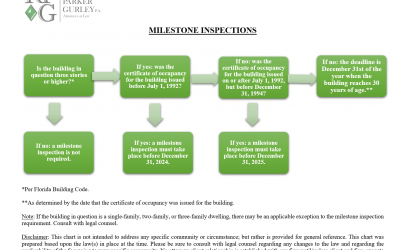When are competitive bids required?
As part of running a community association, it is the responsibility of the Board of Directors to enter into contracts on behalf of the association. For condominium, cooperative, and homeowners’ associations in Florida, understanding the competitive bidding requirements is crucial when entering into contracts for services or purchasing materials. These requirements are outlined in the Florida Statutes and are designed to ensure transparency and fairness in the association’s contracting process.
In that same spirit of transparency, all bids obtained by the association and contracts entered into by the association, with limited exceptions as outlined below, are considered official records of the association and must be maintained for a specific period – typically seven years. Members have the right to inspect these official records, as the legislative intent behind the Condominium Act, Cooperative Act, and Homeowners Association Act is to promote transparency and accountability in the association’s operations.
Condominium Associations (Chapter 718):
- Section 718.3026(1) of the Florida Condominium Act mandates competitive bidding for all contracts related to the purchase, lease, or renting of materials or equipment, or for the provision of services, which require payment by the association exceeding 5% of the total annual budget, including reserves.
Cooperative Associations (Chapter 719):
- Section 719.3026(1) mirrors the language of the Condominium Act. The only difference being that Section 719.3026(2)(a)2 provides as follows:
“A contract executed before January 1, 1992, and any renewal thereof, is not subject to the competitive bid requirements of this section. If a contract was awarded under the competitive bid procedures of this section, any renewal of that contract is not subject to such competitive bid requirements if the contract contains a provision that allows the board to cancel the contract on 30 days’ notice. Materials, equipment, or services provided to a cooperative pursuant to a local government franchise agreement by a franchise holder are not subject to the competitive bid requirement. A contract with a manager, if made by a competitive bid, may be made for up to 3 years. A condominium whose declaration or bylaws provides for competitive bidding for services may operate under the provisions of that declaration or bylaws in lieu of this section if those provisions are not less stringent than the requirements of this section.”
Homeowners’ Associations (Chapter 720):
- Section 720.3055 of the Florida Homeowners’ Association Act mirrors the language of the Condominium Act but with a notable distinction: it requires competitive bids for contracts that exceed 10% of the association’s annual budget, including reserves.
How Many Bids Are Required?
- While the statutes do not specify a minimum number of bids, the term “competitive” implies the need for more than one bid. Associations should obtain enough bids to ensure a comprehensive understanding of pricing options. In other words, an association must obtain at least two bids, but best practice would be to obtain at least three.
Does the Association Have to Accept the Lowest Bid?
- The short answer is no. While obtaining competitive bids is a statutory requirement, associations are not obligated to accept the lowest bid. Instead, the board’s decision may be based on a variety of factors, including the quality of materials or services, the reputation and reliability of the contractor, and the specific needs of the association.
Exceptions to the Competitive Bid Requirements:
- Professional Services: Certain contracts are exempt from the competitive bidding requirements, including those with the association’s attorney, accountant, architect, community association manager, employees of the association, engineers, and landscape architects.
- Emergency Situations: Both statutes provide exceptions for emergency situations, where immediate action is necessary to prevent further damage or ensure safety.
- No Vendors in the Area: When the business entity with which the association desires to enter into a contract is the only source of supply within the county serving the association the bid requirements will not apply.
Still Unsure? Consult Legal Counsel:
- If your association is facing a situation where you’re not sure if the obligation to obtain competitive bids applies, make sure to consult with your legal counsel to discuss your specific situation. Legal guidance can help ensure compliance with statutory requirements and protect the association’s interests.
Final Thoughts:
Before signing any contract, have it reviewed by the association’s attorney. This legal review will help the association better understand its obligations under the contract and protect it in the event of a dispute. For example, including a provision for prevailing party attorney’s fees can be critical. Without such a provision, the cost of litigation could quickly outweigh the cost of addressing a construction defect if a contractor breaches the contract. Ensuring that the association’s interests are adequately protected in the contract can save significant time, money, and hassle in the long run. In other words, its better to be safe than sort.
**This article does not constitute specific legal advice nor does it create an attorney-client relationship. Be sure to consult with legal counsel for advice specific to your community and circumstances.**
Recent Articles:






